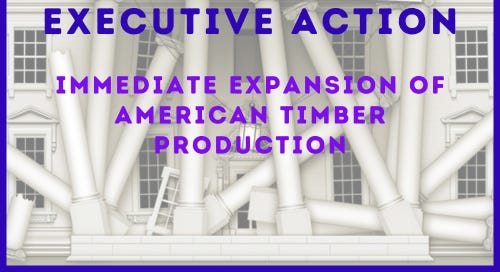Overview:
This executive order mandates an immediate increase in domestic timber production by streamlining permitting processes and expediting forest management projects. The administration argues that boosting timber output is essential for national economic security, reducing reliance on foreign imports, and mitigating wildfire risks. The order directs the Departments of the Interior and Agriculture to issue guidance within 30 days to reduce regulatory barriers, facilitate logging operations, and accelerate timber harvesting on federal lands. While the administration presents this as a strategy to promote economic growth and forest health, critics warn that it could lead to environmental degradation, threaten biodiversity, and weaken protections for public lands.
Detailed Analysis:
Streamlining Permitting and Regulatory Rollbacks:
Policy: Directs federal agencies to expedite timber production by reducing permitting times and regulatory hurdles.
Progressive Concern:
Weakening of Environmental Oversight: Cutting regulatory processes could result in reduced oversight of logging projects, increasing the risk of deforestation and habitat destruction.
Risk to Public Lands: National forests and other federally protected areas may be opened up for commercial logging, threatening their ecological integrity.
Potential for Increased Corporate Exploitation: Streamlining regulations may disproportionately benefit large timber corporations at the expense of sustainable forestry practices and small-scale logging operations.
Accelerated Timber Harvesting and Forest Management:
Policy: Expedites timber harvesting on federal lands, citing the need to prevent wildfires and promote economic stability.
Progressive Concern:
Questionable Effectiveness in Wildfire Prevention: Scientific research suggests that large-scale logging does not necessarily prevent wildfires and may even exacerbate fire risks by altering ecosystems and drying out landscapes.
Threat to Biodiversity and Water Resources: Increased logging can disrupt wildlife habitats, contribute to soil erosion, and negatively impact watersheds that provide clean drinking water to communities.
Short-Term Economic Gains vs. Long-Term Sustainability: Rapid timber extraction could result in temporary economic benefits while compromising long-term forest health and resilience.
Economic and Community Impact:
Policy: Positions timber expansion as a strategy to create jobs, boost rural economies, and reduce dependency on imported wood products.
Progressive Concern:
Risk of Job Instability: The short-term job creation associated with increased logging may not be sustainable if forest resources are depleted too quickly.
Harm to Indigenous and Local Communities: Many Indigenous and rural communities depend on intact forests for cultural, environmental, and economic purposes. Expanding logging could infringe on their rights and traditional land uses.
Need for Sustainable Forestry Investments: Instead of prioritizing deregulation, federal efforts should focus on sustainable forest management, reforestation initiatives, and supporting green infrastructure projects.
Historical Context:
Past Federal Timber Policies: Previous administrations have implemented timber expansion policies, but many were later reversed due to environmental concerns and legal challenges.
Trump Administration’s First-Term Deregulation Efforts (2017-2021): Included attempts to roll back protections for national forests and weaken the National Environmental Policy Act (NEPA) to fast-track logging projects.
Scientific Consensus on Forest Management: While responsible thinning and controlled burns are recognized wildfire mitigation strategies, commercial logging often fails to provide the ecological benefits claimed by proponents.
Broader Implications:
Potential Legal Challenges: Environmental organizations and tribal nations may sue to block logging projects that violate existing land protections and conservation laws.
Climate Consequences: Forests play a crucial role in carbon sequestration. Increasing logging activities could undermine climate goals by reducing the capacity of forests to absorb carbon dioxide.
Public Land Stewardship vs. Private Profit: Expanding timber extraction raises concerns about whether federal land management prioritizes corporate profits over conservation and public interest.
Social Media Posts:
Post 1: President Trump’s executive order pushes for expanded logging under the guise of wildfire prevention—but at what cost? We must protect our forests, not exploit them. Read more: https://www.whitehouse.gov/presidential-actions/2025/03/immediate-expansion-of-american-timber-production/ #ProtectOurForests #ClimateAction #PublicLands
Post 2: Logging more forests won’t stop wildfires—but it will threaten biodiversity, harm local communities, and weaken environmental protections. Sustainable solutions exist. #StopDeforestation #SustainableForestry #PeopleOverProfits
Post 3: Forests are vital for clean air, water, and climate resilience. Prioritizing timber production over conservation is a step backward. Let’s fight for responsible land management. #ForestsNotProfit #ClimateJustice #ProtectPublicLands



